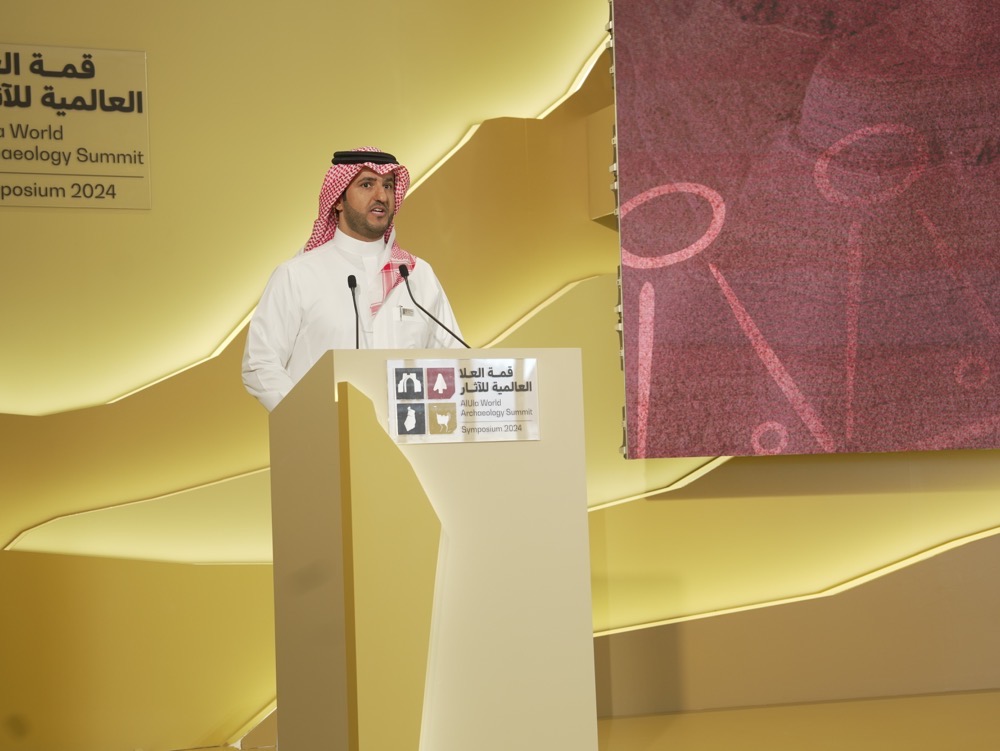ALULA: Antiquity came alive here at the first AlUla World Archaeology Summit Symposium 2024 titled “Moving Forward: Past, Present and Future in the Archaeology and Heritage of Mobile Communities.”
Held on Oct. 30 and 31, it was organized by the Royal Commission for AlUla and is a part of the new biennial series aimed at fostering global dialogue among experts in archeology and cultural heritage.
This year’s symposium provided a platform for in-depth discussions on the interactions between mobile and settled communities, with participants sharing global research, case studies and best practices.
The event took place at Maraya, the world’s largest mirrored building, which has 9,740 glass panels reflecting AlUla’s desert and landscape.
Built in 2019, Maraya has become an iconic part of AlUla’s cultural scene, hosting concerts, exhibitions and events that showcase both modern and traditional Saudi Arabia culture.
It was the perfect place to quite literally reflect on the past, while living in the present and looking to the future.
Reflecting on the symposium’s theme of mobility, organizers also addressed the global experience of halted movement during the recent COVID-19 global pandemic.
The theme of this year’s symposium encouraged critical examination of past and present mobility, from prehistory onward, as people have moved for various reasons; to access scarce resources, adapt to environmental pressures and respond to socio-political instability.
Speakers from six continents gathered to discuss topics including trade, commerce, climate change and conflict — all of which have shaped mobile communities throughout history.
The symposium highlights included keynote addresses by Willeke Wendrich from the University of California, Los Angeles, Stefano Biagetti from Pompeu Fabra University, UNESCO’s Peter DeBrine, and Khalid Alasmari from King Saud University.
Attendees visited archeological sites in Khaybar and Tayma and participated in panels and workshops focused on Saudi Arabia’s expanding role in archaeology.

Abdulrahman Alsuhaibani, vice president of culture at the RCU, spoke about AlUla’s unique heritage in light of the symposium, describing itas‘a crossroads for connection, cultural and knowledge exchange.’ (Supplied)
In addition, the symposium program featured a new, specially-curated showcase of recent archaeological discoveries in AlUla, along with a preview of a world-first exhibition that will include artifacts from the Museo Archeologico Nazionale di Napoli in Italy.
Ekhlass Al-Qananweh, who holds a doctorate in Northwest Semitic epigraphy, expressed delight at attending the symposium.
“I have a deep interest in antiquities in the Kingdom of Saudi Arabia and journeyed here from Jordan to the architectural marvel that is Maraya to attend this gathering of the sharpest minds in the world of archaeology,” she told Arab News.
“In addition to the talks, I look with keen interest at the extremely qualified upcoming generation of archeologists — many of whom are in attendance — and I’m particularly interested in the vital participation of Saudi women in the field of archeological studies and in managing heritage and preserving it.”
During an Arab News interview, Adam Ford, cultural-heritage content expert at the royal commission, emphasized AlUla’s global significance and why it was chosen as host of the symposium.
“It is the World Archaeology Summit — it’s not an AlUla Summit. We want the world to come to us to discuss the world,” he said.
“The local community should be regarded as research partners with us,” he said, reiterating the RCU’s commitment to involving indigenous populations in preserving their heritage and amplifying it worldwide.
Ford also shared personal insights on the continuity of human experience across millennia. “We stand on the shoulders of giants … millions of actions and decisions and mistakes made by people of the past all culminate to now.”
He said that “although we will never meet these people,” their stories and choices continue to shape humanity’s present, emphasizing a universal pattern to endure, overcome challenges and pass on knowledge to future generations.
Certainly, if the lands could speak, they would echo stories that date back thousands of years when Lihyanite and Nabataean kingdoms reigned.
Today, AlUla contains lush oases, mountains and ancient heritage sites — as well as a thriving modern society. The best-known location in AlUla is Hegra, Saudi Arabia’s first UNESCO World Heritage Site.
A 52-hectare ancient settlement, Hegra was the principal southern city of the Nabataean kingdom. It comprises more than 100 well-preserved tombs, many with elaborate facades cut out of the sandstone outcrops surrounding the walled urban settlement.
In addition, AlUla is home to ancient Dadan, the capital of the kingdoms of Dadan and Lihyan, which is considered to be one of the most developed cities of the first millennium B.C.E. in the Arabian Peninsula.
There is also Jabal Ikmah, an open-air library with hundreds of inscriptions and writings, which has been listed on UNESCO’s Memory of the World Register.
AlUla Old Town, a hodgepodge, labyrinth of more than 900 mudbrick homes, dotted with small businesses developed from at least the 12th century, was selected as one of the world’s Best Tourism Villages in 2022 by UN Tourism.
Abdulrahman Alsuhaibani, vice president of culture at the RCU, spoke about AlUla’s unique heritage in light of the symposium, describing it as “a crossroads for connection, cultural and knowledge exchange.”
“Today, AlUla is one of the world’s most active areas for archeological exploration, with over 30,000 areas of archeological interest identified and more than a dozen active research projects,” he said.
“We established this event to become a progressive and leading platform for dialogue and collaboration, holding the first gathering in 2023 with an alternate format of symposium one year and summit the next.
“We are already laying the groundwork to build on the momentum of this event and for AWAS 2025.”



























